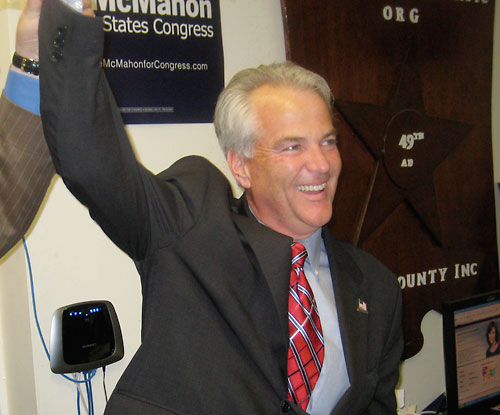New Bay Ridge Rep. Mike McMahon was one of the handful of congressmen who put the kibosh on President Obama’s hopes of quick passage of health care reform this year.
And — guess what — he’s proud of his efforts.
The first-term representative was one of 22 freshmen who sent a letter to House Speaker Nancy Pelosi last week claiming that the bill would “discourage entrepreneurial activity and job growth” because its burden would fall too heavily on small businesses.
As a result of the letter, and growing discontent among more conservative factions of the Democratic Party (and, of course, complete lack of support from the GOP), the vital issue of reforming our expensive, inflationary and, frankly, not so good health care system has been put off.
It was clearly time to get McMahon on Line 1.
Brooklyn Paper: We want you to know, Congressman, that the honeymoon is over.
Rep. Mike McMahon: Oh, so you’re one of the people who want universal health care for free?
BP: Now that you mention it… But, seriously, didn’t you once tell our readers, “We can’t stabilize the economy without dealing with big-cost items like health care. Every small businessman knows that this is the biggest problem.” So what changed? Why are you on a letter with nearly two-dozen non–New Yorkers opposing this bill?
McMahon: The problem is that the way they are financing the plan. It would have a deleterious effect on small businesses because they are charged. If you are a subchapter S and report your business taxes on your personal tax return, you’re hit with a high tax. And if you’re a very small business, with an annual gross of $250,000, you get hit with a tax as well. So this doesn’t help small businesses. It hurts them.
BP: But doesn’t health care reform and health care cost cutting help everyone the long run?
McMahon: We want to get coverage without killing the jobs that small businesses create. They won’t be able to hire people if they have to pay for the new coverage. The idea is to make the coverage more affordable and give them the opportunity to purchase it.
BP: Exactly — a public health care system!
McMahon: There is a public component that makes a lot of sense. But the small businesses are not going to do it if you’re taxing them twice. And the other objection was that you want to tax the wealthy, but in New York City, a couple making $250,000 ain’t wealthy. So as a result of our letter, the speaker is raising the bar, if you will.
BP: Come on. If you make $250,000, even in New York City, you’re well off. You can pay a bit more, can’t you?
McMahon: You’re not wealthy. If you take a fire lieutenant with a little overtime married to an assistant principal, there’s a couple making $250,000. They’re not rich.
BP: Yes, but health care reform will save them in the long run, too. The New York Times reported the other day that our health care costs that same fire lieutenant and his wife about $6,500 more than a Japanese or Canadian fire lieutenant and his Japanese or Canadian wife. And the article quoted a bigwig from Stanford saying, “The fact that we spend all this money and don’t have better outcomes than other countries is a sign of how poorly we’re doing.” Doesn’t that sway you towards immediate action?
McMahon: We do want to bring down the cost of coverage and health care. That has to be a focus of this bill, and there has not been enough focus on that. But we have a bill in the House and the Senate has two different versions — and your guy McMahon is trying to make sure the bill is as good as possible, one that will hold down costs. We spend 17 percent of our gross domestic product on health care. It’s the most of any other nation. We are spending a lot and we’re not getting the bang for our buck. But asking small businesses to get hit with a double-whammy is not the way. You can’t tell me that you think that just because a bill that it’s the right bill. We have to have a bill that will work.
BP: But you work in Inertiaville. Can anything get through the legislature this year and onto the president’s desk? Or is this just another thing in D.C. that gets talked about, but never actually done?
McMahon: I believe it will be done this year.
BP: But you’re the freshman whip. You got that letter written and now it’s killed the momentum.
McMahon: No, the letter had a good effect. The discussion is ongoing. It won’t derail the train, but it will put it on a better track.
BP: OK, we’ll extend the honeymoon for a few more weeks. But we want to see results.
























